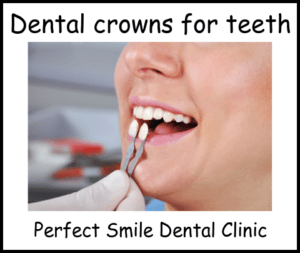Dental crowns for teeth
Dental crowns for teeth are a great idea if you have damaged your teeth through an accident.
Similarly if your teeth are decayed, misshapen, weak or worn down dental crowns can restore those teeth.
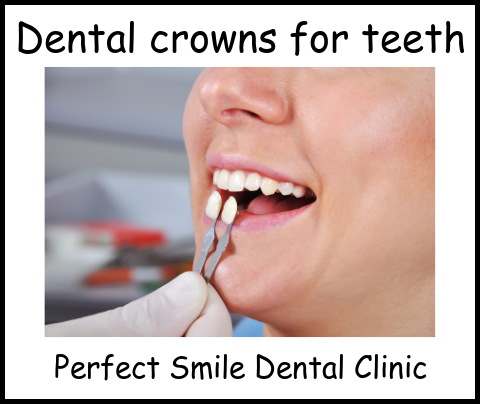
Dental Crowns-the facts
A dental crown is made in a dental laboratory by a qualified and experienced technician.
The technican will make your dental crown from a dental impression that was taken by a dentist.
Basically, the crown is designed in such a way as to fit like a glove over each tooth that needs restoration.
Dental crowns for teeth are also used to go on top of an abutment that is attached to an implant.
Where root canal treatment has been done a dental crown will be used to cover the tooth where the root canal procedure was completed.
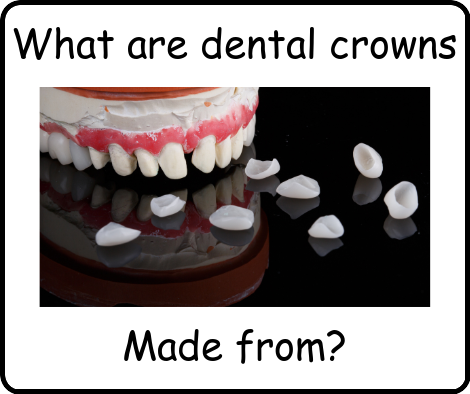
What are they made from
A dental crown for teeth is created using different materials that include porcelain, PFM ( Porcelain-Fused-to-Metal), metal, pressed ceramic and all resin.
Porcelain crowns
Porcelain or all ceramic crowns closely if not totally resemble the look of tooth enamel moreso than any of the others.
In addition a porcelain or all ceramic crown are a better choice if you are allergic to metals.
The dental technician has the use of a choice of materials, the most popular dental crown is made from zirconium oxide.
Zirconium oxide is unbelievably strong making Zirconia crowns very durable.
This means that they can stand strong against the heavy chewing and eating on a daily basis.
Zirconia crowns
Zirconia dental crowns for teeth are more gentle on the opposite teeth meaning less wear and tear on tooth enamel.
PFM ( Porcelain-Fused-to-Metal)
PFM or Porcelain-Fused-to-Metal dental crowns for teeth combine well the natural porcelain look and the metal durability.
As well as that, PFM crowns can be made to exactly match the shade of your natural teeth.
There are one or two negetatives with PFM, they are porcelain coated and this can over time chip off.
If this happens the metal underneath becomes exposed.
Another negative is the fact that PFM crowns will over time wear down the enanel on tooth opposite.
A PFM crown are good in terms of durability, they last nearly as long as a metal crown.
They can be used to restore both the front teeth and the back teeth.
Ceramic crowns
Pressed ceramic crowns
Pressed ceramic dental crowns for teeth have a tough inner core, they are very like PFM.
The difference being the core is made from pressed ceramic not metal.
To make the inner core tough the laboratory technician will melt and press ceramic in an oven at an extreme temperature.
The next step is to add many layers of porcelain, porcelain crowns and pressed ceramic crowns mimic natural enamel on teeth.
In the same way as PFM crowns pressed ceramic crowns can chip away over a period of time.
They are used mainly for the front and back teeth.
Technician use many types
Metal crowns
A dental technician specialist can use many types of metals to create dental crowns.
These metals include chromium, gold, nickel or pallidum.
One of the biggest advantages of metal crowns is the fact that they very rarely break or chip.
In terms of wear and tear, metal crowns last longer than any other material used.
In terms of biting and chewing forces, metal crowns can withstand a lot.
Because of their colour, metal crowns are probably better used at the back of the mouth where the molars are.
All-resin crowns
All resin crowns for teeth are less costly than the other crown types, however they are quite fragile, they can break.
PFM is the stronger of the two, less fragile and not as likely to break.
All resin crowns are used by dentists where temporary crowns are needed, on average they last 3-5 years.
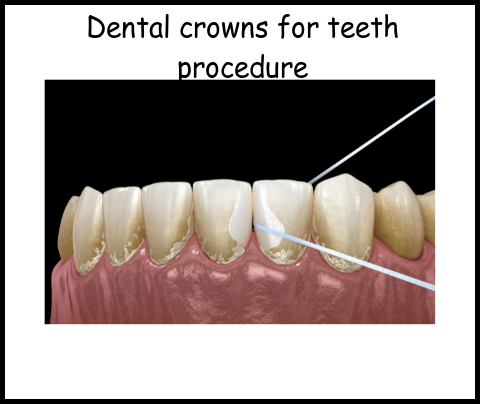
Crowns for teeth procedure
The crowns for teeth procedure will typically involve two visits to the clinic.
The first visit
On your first visit, our dentist will need to prepare your teeth to take the dental crowns:
A. Some of the natural enamel on your affected teeth will need to be removed to make room for your new dental crown.
This action ensures that the new crown once it is bonded stays in place and does not move.
Your affected teeth may also require a type of filling to build up certain parts of the teeth.
Basically these steps are to make sure each affected tooth is made as string as possible.
B. A dental impression is taken, using either a putty type material or by using a hand held digital scanner.
The impression is brought to the laboratory where your new dental crowns for teeth are brought to life.
C. In some dental laboratories you may have to wait for your dental crowns for teeth to be created.
In our state-of-the-art dental clinic Perfect Smile Hungary we own the onsite dental laboratory so you don’t have to wait long for your new teeth.
We can have your new dental crowns for teeth ready in a couple of days.
This means that you only need to come to Hungary once for this treatment.
We can look after the next visit in Hungarian Dentists Wexford.
The second visit
In most clinics that don’t have their own lab onsite will need to bring you back for a second visit. ( 2-3 weeks wait).
In the interim, you will be fitted with temporary dental crowns for teeth.
Recovery time after the procedure
People often want to know about recovery time after the procedure.
How long before you can resume your normal daily activities, there will be a small level of sensitivity.
This is limited to hot or cold food or drinks, there may be a bit of tenderness.
These are all quite natural side effects and you hould be back to normal inside the first week.
If there is a small bit of pain, take some ibuprofen or solpedine.
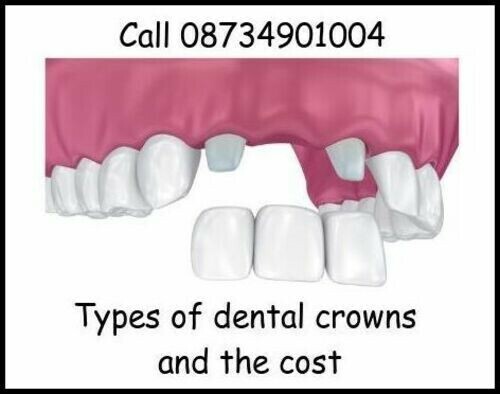
Cost of dental crowns
As usual the cost of dental crowns for teeth is what it all boils down to.
Suffice to say, a single dental crown will set you back at least €600 in most dental clinics in Ireland.
Contact Fintan on 087 349 0104 if you want to save money on dental crown treatment by going to Perfect Smile Dental Clinic in Hungary.
Foods to avoid
Hard foods are ones that you should avoid, for example:
- Very hard nuts
- Ice cubes
- Sticky foods such as caramel
- Popcorn (kernels)
Dental crowns for teeth care
This part called dental crowns for teeth care is important, you should:
- Use a flouride toothpaste
- Brush your teeth twice a day (or more)
- Use floss products to get between your teeth
- Avoid those hard foods
- Get regular check-ups
- Use a quality antibacterial mouth wash
Conclusion
This detailed post on dental crowns for teeth should give you a good indication as to dental crowns are suitable for you.
Contact us at Hungarian Dentists in Wexford for further information on dental crows for teeth.
Reference
https://www.ncbi.nlm.nih.gov/pmc/articles/PMC9546353/


